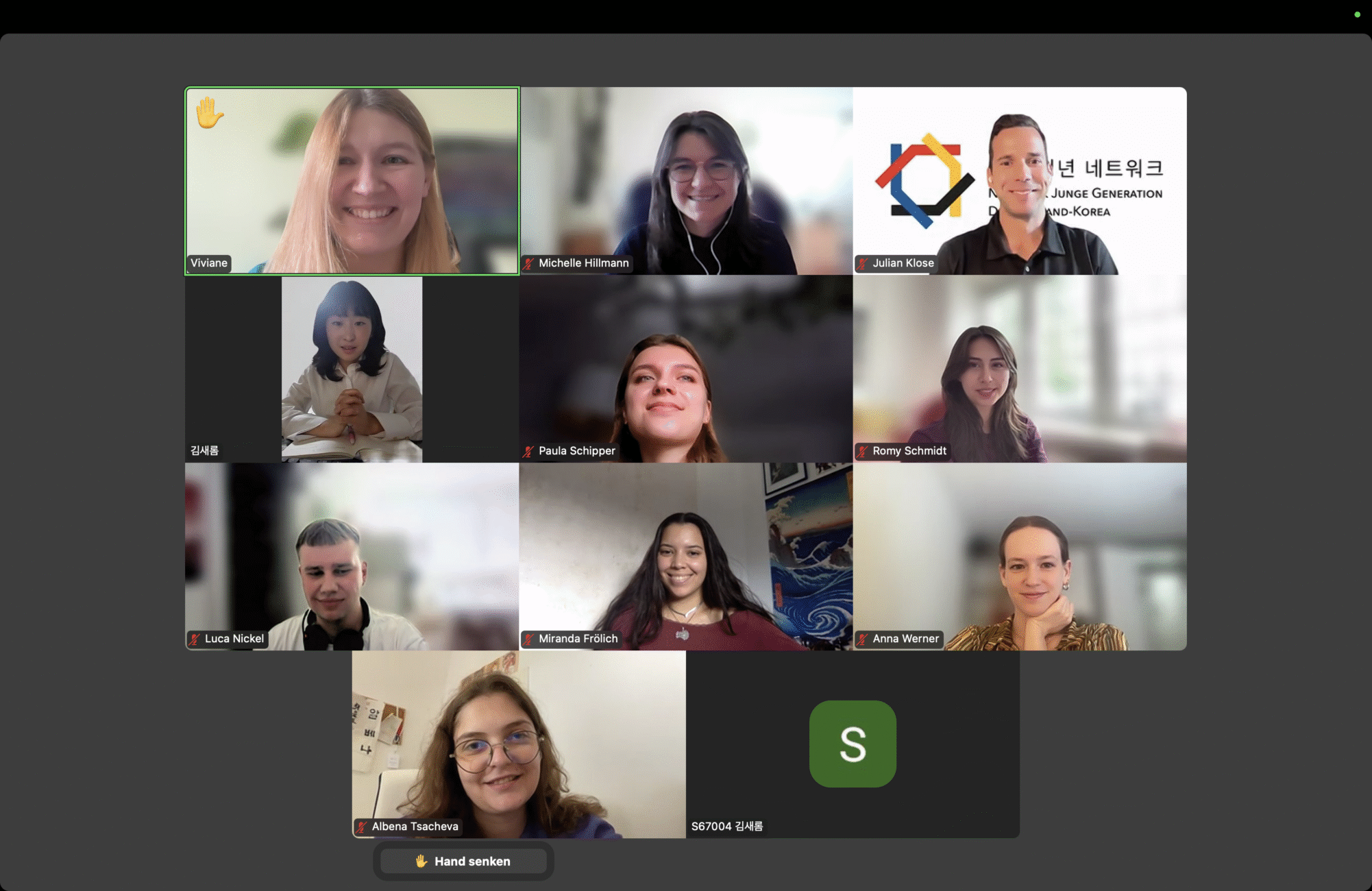(von Julian Klose)
Veranstaltungsbericht: Youth and the Future of Korean Unification
 Am Samstag, 23. August 2025, lud das Netzwerk Junge Generation Deutschland Korea zu einer spannenden Präsentation unter dem Titel „Youth and the Future of Korean Unification“. Referentin war Saerom Kim, die seit Jahren im Bereich Unifikationsbildung aktiv ist. Mit Erfahrungen als nationale Debattenmoderatorin zu jugendrelevanten Themen, einer Bachelorarbeit zur Unifikationspädagogik und Projekten zur internationalen Nordkorea-Verständigung brachte sie eine vielseitige Perspektive ein.
Am Samstag, 23. August 2025, lud das Netzwerk Junge Generation Deutschland Korea zu einer spannenden Präsentation unter dem Titel „Youth and the Future of Korean Unification“. Referentin war Saerom Kim, die seit Jahren im Bereich Unifikationsbildung aktiv ist. Mit Erfahrungen als nationale Debattenmoderatorin zu jugendrelevanten Themen, einer Bachelorarbeit zur Unifikationspädagogik und Projekten zur internationalen Nordkorea-Verständigung brachte sie eine vielseitige Perspektive ein.
Die Präsentation beleuchtete eindrücklich, wie sich die Wahrnehmung der jungen Generation in Südkorea zur Wiedervereinigung in den letzten Jahren verändert hat. Laut den neuesten Umfragen des Institute for Peace and Unification Studies (IPUS) glaubt nur noch rund ein Fünftel der jungen Erwachsenen an die Notwendigkeit einer Vereinigung, während knapp die Hälfte diese ablehnt oder sie sogar für unmöglich hält. Gründe dafür sind vor allem wirtschaftliche Sorgen und die Furcht vor sozialen Spannungen nach einer möglichen Vereinigung.
Darüber hinaus ging die Referentin auf die Lebensrealität junger Menschen in Korea ein: eine hohe Zahl sogenannter „resting youth“, wachsende Unsicherheit auf dem Arbeitsmarkt und die weltweit niedrigste Geburtenrate. Diese Faktoren prägen maßgeblich, wie die Jugend über ihre Zukunft und damit auch über das Thema Wiedervereinigung nachdenkt. Ein weiterer Schwerpunkt war die Unifikationsbildung in Südkorea. Trotz gesetzlicher Grundlage und fest verankerter Bildungsprogramme bleibt es eine Herausforderung, junge Menschen wirklich zu erreichen. Der neue Grundplan für die Unifikationsbildung 2025 setzt deshalb auf innovative Lernformen wie KI-gestützte Programme oder virtuelle Realität, um Jugendlichen neue Zugänge zu eröffnen.
Die Veranstaltung endete mit einer offenen Diskussion, in der Fragen nach alternativen Modellen zur klassischen Vereinigung, den wichtigsten gesellschaftlichen Werten sowie den Verknüpfungen zwischen den sozioökonomischen Realitäten und der Unifikationsfrage im Mittelpunkt standen. Die lebhaften Gespräche machten deutlich: Junge Menschen sind heute nicht weniger engagiert, aber sie suchen nach neuen, kreativen Wegen, um die Zukunft der koreanischen Halbinsel mitzugestalten.


![[Video] Generation Nachhaltigkeit: Eine Studienreise nach Korea](https://netzwerk-junge-generation.de/wp-content/uploads/2025/11/IMG_7498-scaled-500x383.jpeg)
![[Bericht] Studienreise „Generationsgerechtigkeit im Zeitalter des demographischen Wandels“](https://netzwerk-junge-generation.de/wp-content/uploads/2025/11/Miranda-500x383.png)
![[Bericht] Netzwerk-Meetup in Seoul](https://netzwerk-junge-generation.de/wp-content/uploads/2025/11/IMG_8293-scaled-e1765918402271-500x383.jpg)
![[Bericht] Juniorforum in Seoul 2025](https://netzwerk-junge-generation.de/wp-content/uploads/2026/01/삼정호텔_-1267-scaled-500x383.jpg)